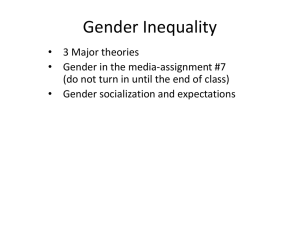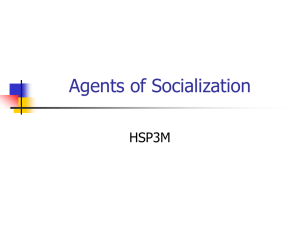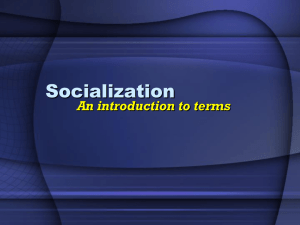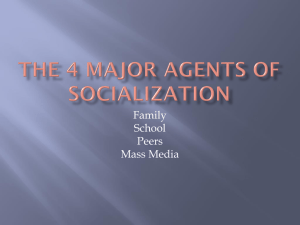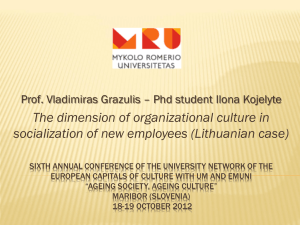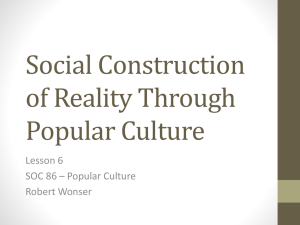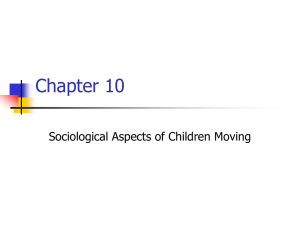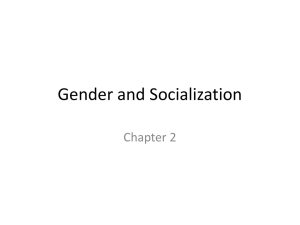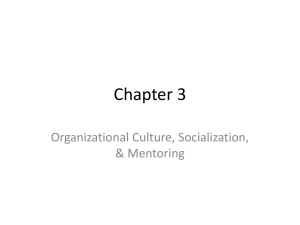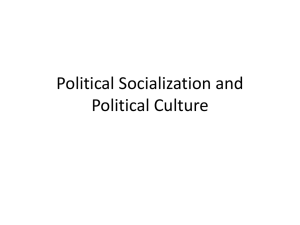May 16-June 10
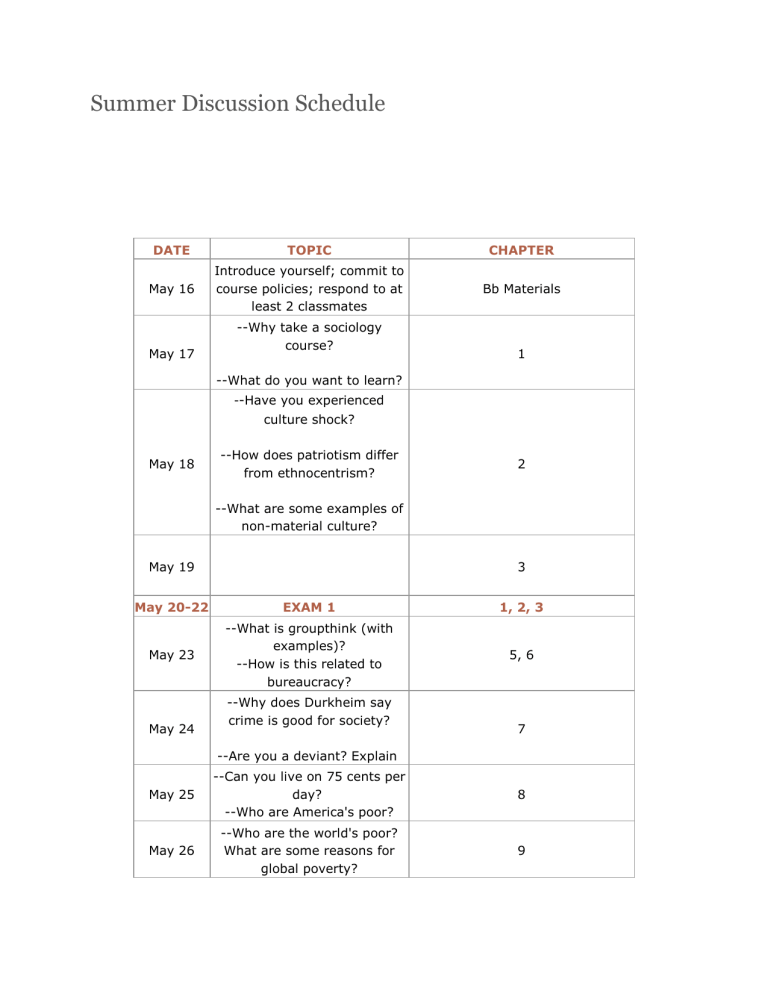
Summer Discussion Schedule
DATE
May 16
May 17
TOPIC
Introduce yourself; commit to course policies; respond to at least 2 classmates
--Why take a sociology course?
--What do you want to learn?
-Have you experienced culture shock?
May 18
--How does patriotism differ from ethnocentrism?
May 19
--What are some examples of non-material culture?
May 20-22
May 23
May 24
EXAM 1
--What is groupthink (with examples)?
--How is this related to bureaucracy?
--Why does Durkheim say crime is good for society?
May 25
May 26
--Are you a deviant? Explain
--Can you live on 75 cents per day?
--Who are America's poor?
--Who are the world's poor?
What are some reasons for global poverty?
CHAPTER
Bb Materials
1
2
7
8
9
3
1, 2, 3
5, 6
May 27-29
May 31
EXAM 2
--What have been the most important agents of socialization for you so far?
--Why are 'sissies' chastised more strongly than 'tomboys'?
June 1
--Is immigration good or bad for society?
June 2
June 3-5
--Define "family"
--How will the American family change in the future?
--Why is religion an important institution for sociologists to study?
EXAM 3
--In what ways should the government change to be more responsive to more
Americans?
June 6
June 7
--What are some of the problems that led to the economic crisis facing America today?
--Have you ever engaged in collective behavior? Explain
June 8-10 EXAM 4
Summer Discussion Schedule
5-9
4, 11
10
13
4, 10, 11, 13
15
16
15, 16
DATE
May 16
May 17
TOPIC
Introduce yourself; commit to course policies; respond to at least 2 classmates
--Why take a sociology course?
--What do you want to learn?
-Have you experienced culture shock?
May 18
--How does patriotism differ from ethnocentrism?
May 19
--What are some examples of non-material culture?
May 20-22
May 23
May 24
EXAM 1
--What is groupthink (with examples)?
--How is this related to bureaucracy?
--Why does Durkheim say crime is good for society?
May 25
May 26
--Are you a deviant? Explain
--Can you live on 75 cents per day?
--Who are America's poor?
--Who are the world's poor?
What are some reasons for global poverty?
May 27-29
May 31
EXAM 2
--What have been the most important agents of socialization for you so far?
--Why are 'sissies' chastised more strongly than 'tomboys'?
CHAPTER
Bb Materials
1
2
3
1, 2, 3
5, 6
7
8
9
5-9
4, 11
June 1
June 8-10
--Is immigration good or bad for society?
June 2
June 3-5
--Define "family"
--How will the American family change in the future?
--Why is religion an important institution for sociologists to study?
EXAM 3
--In what ways should the government change to be more responsive to more
Americans?
June 6
June 7
--What are some of the problems that led to the economic crisis facing America today?
--Have you ever engaged in collective behavior? Explain
EXAM 4
Summer Discussion Schedule
DATE
May 16
TOPIC
Introduce yourself; commit to course policies; respond to at least 2 classmates
--Why take a sociology course?
May 17
--What do you want to learn?
10
13
4, 10, 11, 13
15
16
15, 16
CHAPTER
Bb Materials
1
--Have you experienced culture shock?
May 18
--How does patriotism differ from ethnocentrism?
May 19
May 20-22
May 23
May 24
--What are some examples of nonmaterial culture?
--Should social sciences try to emulate the natural sciences in research methods?
EXAM 1
--What is groupthink (with examples)?
--How is this related to bureaucracy?
--Why does Durkheim say crime is good for society?
May 25
--Are you a deviant? Explain
--Can you live on 75 cents per day?
--Who are America's poor?
May 26
--Who are the world's poor?
What are some reasons for global poverty?
May 27-29
May 31
EXAM 2
--What have been the most important agents of socialization for you so far?
--Why are 'sissies' chastised more strongly than 'tomboys'?
June 1
June 2
June 3-5
--Is immigration good or bad for society?
--Define "family"
--How will the American family change in the future?
--Why is religion an important institution for sociologists to study?
EXAM 3
2
7
8
3
1, 2, 3
5, 6
9
5-9
4, 11
10
13
4, 10, 11, 13
--In what ways should the government change to be more responsive to more Americans?
June 6
June 7
--What are some of the problems that led to the economic crisis facing
America today?
--Have you ever engaged in collective behavior? Explain
June 8-10 EXAM 4
SCHEDULE - SUMMER 2010
June 14-July 9
15
16
15, 16
Schedule Overview
1
6
7
8
9
2
3
4
5
This very accelerated semester consists of 19 days of instruction
The material is divided into 4 units
All unit materials are accessed through the course Learning Modules
Each unit contains lectures, discussions, a quiz, and puzzles for study
DAY DATE TOPIC CHAPTER
June 14
June 15
June 16
June 17
June 18
June 21
June 22
June 23
June 24
Introduction
Soc Perspective
Culture
Interaction & Structure
EXAM 1
Groups
Stratification I
Stratification II
Deviance
Syllabus, etc
5
7
8
6
1
2
4
1, 2, 4
14
15
16
18
10
11
12
13
June 25
June 28
June 29
June 30
July 1
July 6
July 7
July 7
EXAM 2
Gender & Socialization
Race & Ethnicity
Families & Religion
EXAM 3*
Politics & Economy
Collective Behavior
EXAM 4
*We open Quiz 3 one day early to allow students to enjoy the 4th of July Weekend
HEDULE - SUMMER 2011
May 16-June 10
5-8
3, 10
9
12
3, 9, 10, 12
14
16
14, 16
Schedule Overview
1
4
5
2
3
This very accelerated semester consists of 19 days of instruction
The material is divided into 4 units
All unit materials are accessed through the course Learning Modules
Each unit contains lectures, discussions, a quiz, and puzzles for study
DAY DATE TOPIC CHAPTER
6
7
May 16
May 17
May 18
May 19
May 20-22
May 23
May 24
Introduction
Soc Perspective
Culture
Research Methods
EXAM 1
Interaction, Structure & groups
Deviance
Syllabus, etc
1
2
3
1, 2, 3
5, 6
7
12
13
14
15
8
9
10
11
16
17
May 25
May 26
May 27-29
May 31
June 1
June 2
June 3-5
June 6
June 7
June 8-10
Stratification
Stratification II
EXAM 2
Gender & Socialization
Race & Ethnicity
Families & Religion
EXAM 3
Politics & Economy
Collective Behavior & Social
Change
EXAM 4
8
9
5, 6, 7, 8, 9
4, 11
10
13
4, 10, 11, 13
15
16, eReserve
15, 16, eReserve
UNIT 2
Welcome to Unit 2
We spend this unit exploring the ways humans interacts and arrange ourselves into groups (we don't do well alone). We investigate inequalities and reasons for stratification. We also spend one short day investigating deviance (some sociologists spend their entire careers on this one topic!)
In this learning module you will find the Quiz #2 Review Sheet and the discussion topics for May 23-26.
Remember that to earn participation points, students are required to log in frequently Monday-Thursday, read all new posts, and post one scholarly message that relates to the discussion topics for that particular day. Please note that we think all of the topics are interesting, but because of time limitations, we must move through the material and stay on schedule. Please do not continue to post on topics that have already passed.
While personal experiences are fine to illustrate a point, please remember that discussions should be scholarly. One of the learning goals of the daily discussion is for the Teaching Team to assess your understanding of the material in the text. We want to be sure you read and understand everything!
The quizzes are found in the ASSESSMENTS area of Blackboard. They are timed, open book and the Honor
Code is in force. There is more information about Blackboard quizzes here in the Learning Module. If you have any questions or need help, feel free to contact a member of the Teaching Team!
To see the Lectures, Discussion topics for each week, or Quiz review sheets in this unit, just double click on any one of these headings in the menu (the heading is in black but if you double-click, you will be taken to the appropriate pages). If you need help, let us know.
Here is a link to the publisher's site. You may find additional study aids:
Wadsworth
Please follow the steps below and create a Blog to house your CIB. You may use a Wiki if you are more comfortable with that format (see below for shareware). Your CIB must include the following:
1. Create a Blog to house your project (the Teaching Team will provide resources and help with this)
2. Your first entry/post should be a ‘homepage’ telling your visitors something about you and your interest in sociology in general with at least one illustration (drawing, photograph, painting) and a poem or quote that reflects your thinking about the power of sociology to help us understand our world and our own lives
3. Choose 2 chapters from the text that particularly interest you
4. Create a separate entry/post in your Blog for each chapter
5. Each chapter (entry) should have the following:
1--At least one paragraph that describes why you chose that chapter and the specific supporting materials you included on your page
2--A link to one scholarly journal, newspaper, or magazine article that best represents specific concepts or a theory that particularly interest you from that chapter (or a part of the chapter). Be sure to include a sentence or two that explains where the link is taking your visitor and why you chose this particular article.
3--One photograph, painting, drawing, or other visual illustration that best symbolizes the main theme of the chapter (or a part of the chapter that particularly interests you)
4—Embed or link to one video clip that describes/explains a specific concept or theory from your chapter (YouTube is the best place to search for these!)
5--Link to two Internet sites (URL and two sentences describing the site) that provide useful information to the reader about the concepts in the chapter (or the part of the chapter that interests you)
6--One poem, quote, or song lyrics that represent the feelings you had reading the chapter
6. The last entry should be a two paragraph essay discussing what the emerging issues are in society as studied in sociology (choose one or two major global concerns or predictions that were covered in your chapters).
7. The Blog address should be posted in the assignments folder Bb no later than June 5 (you should post the URL as soon as you know it, just to be sure you don't miss the deadline! Be sure the address works! !
We won't start evaluating until the 6th of June.
Please follow the steps below and create a Blog to house your CIB. You may use a Wiki if you are more comfortable with that format (see below for shareware). Your CIB must include the following:
1. Create a Blog to house your project (the Teaching Team will provide resources and help with this)
2. Your first entry/post should be a ‘homepage’ telling your visitors something about you and your interest in sociology in general with at least one illustration (drawing, photograph, painting) and a poem or quote that reflects your thinking about the power of sociology to help us understand our world and our own lives
3. Choose 2 chapters from the text that particularly interest you
4. Create a separate entry/post in your Blog for each chapter
5. Each chapter (entry) should have the following:
1--At least one paragraph that describes why you chose that chapter and the specific supporting materials you included on your page
2--A link to one scholarly journal, newspaper, or magazine article that best represents specific concepts or a theory that particularly interest you from that chapter (or a part of the chapter). Be sure to include a sentence or two that explains where the link is taking your visitor and why you chose this particular article.
3--One photograph, painting, drawing, or other visual illustration that best symbolizes the main theme of the chapter (or a part of the chapter that particularly interests you)
4—Embed or link to one video clip that describes/explains a specific concept or theory from your chapter (YouTube is the best place to search for these!)
5--Link to two Internet sites (URL and two sentences describing the site) that provide useful information to the reader about the concepts in the chapter (or the part of the chapter that interests you)
6--One poem, quote, or song lyrics that represent the feelings you had reading the chapter
6. The last entry should be a two paragraph essay discussing what the emerging issues are in society as studied in sociology (choose one or two major global concerns or predictions that were covered in your chapters).
7. The Blog address should be posted in the assignments folder Bb no later than July 3 (you should post the URL as soon as you know it, just to be sure you don't miss the deadline! Be sure the address works! !
We won't start evaluating until the 5th of July.
Quiz Review #3
Quiz 3 Wednesday, June 30 12:30am, July 3 - Midnight Saturday, July 3 (Moscow,
Idaho time)
Chapters 3, 9, 10, 12
50 points
60 minutes
Open Book
Honor Code in force
Avoid taking the quiz on Friday evening as ITS takes Blackboard offline at 5:30pm
for maintenance
NOTE: THE LIST IS NOT EXHAUSTIVE!! It is intended to start you off in the right direction and to help you focus your careful reading and study of the material. Do not rely solely on this list in your preparation for quizzes.
CHAPTER 3: SOCIALIZATION AND THE LIFE COURSE
LEARNING OBJECTIVES
Define socialization and give examples of it at varying stages in an individual’s life.
Discuss how socialization defines the individual’s identity and shapes the child’s personality.
Define what is meant by norms; give examples of norms in the American culture.
Explain what sociologists mean when they say that socialization acts as a social control mechanism that teaches the culture’s domina nt social values and beliefs that, in turn, give predictability to the culture.
List and describe the six agents of socialization discussed by Anderson and Taylor.
Give examples of each of these six agents and indicate which ones are most influential at ea ch of the different stages in a person’s life cycle
Discuss the negative consequences of socialization (for example, children learn racial and gender-specific stereotypes in school along with basic educational skills).
Compare and contrast the psychoanalytic and social learning theories to the major sociological perspectives of functionalism, conflict, and symbolic interaction as they pertain to the socialization process.
Gives examples of the application of each of these perspectives to socialization in terms of how each explains the concepts of individual learning process, formation of self and influence of society.
Explain Piaget’s contributions to understanding socialization. Define each of his stages of cognitive development.
How does Carol Gilligan explain the differences between men and women in terms of their moral reasoning?
Discuss the roles that Charles Horton Cooley and George Herbert Mead had in developing the symbolic interaction school of thought.
Explain the concept of looking glass self developed by Charles Horton Cooley.
Explain what George Herbert Mead meant by the concepts I, Me and Generalized
Other.
Explain and give examples of each of the three stages of childhood socialization identified by G.H. Mead: the imitation, the play, and the game stages.
Discuss how multiracial and multicultural environments are changing in the U.S. and how these changes impact the socialization process for our nation’s children.
Explain the findings of Ausdale and Feagin in terms of how language and skin color are used as ethnic markers and the relationship of the parent’s perception of race and ethnicity to the real world of social interactions.
Discuss socialization in childhood, adolescence, adulthood, and old age.
Differentiate between primary and anticipatory socialization.
Explain the similarities and differences between racial, gender, and age stereotypes. Do they restrict opportunity to social resources?
Define age stratification and give examples that demonstrate how it both provides and limits access to resources such as rewards, power, and prestige.
Define age cohorts.
Explain how age stratification shapes society and the experiences of different age cohorts.
Define ascribed status and achieved status and give examples of each.
Explain how retirement or disengagement is functional to the society and how conflict and symbolic interaction theories explain this age cohort, or aging process.
Define the social processes of rites of passage, resocialization, conversion, and brainwashing.
CHAPTER 9: RACE AND ETHNICITY
LEARNING OBJECTIVES
Define, differentiate between, and give examples of the following sociological concepts: ethnicity, race, minority group, and dominant group.
Explain what sociologists mean when say that race is a social construct and that how racial grouping is a social process.
Describe the factors that lead to a group ethnic identity.
Explain the process by which some social categories such as social class or nationality take on racial characteristics. Define racialization and racial formation and describe how they apply.
Discuss the dilemma of perceived skin color and race categorization or assignment.
Differentiate between and give the characteristics of minority groups and majority groups.
Explain the functions and dysfunctions of stereotypes for the society and for the individual. Describe how salience is related to stereotypes.
Explain the interplay between race, gender and class stereotypes and give examples of the stereotypes for each of these social categories. Give examples of stereotype exchangeability.
Discuss how prejudice and ethnocentrism go hand in hand and how are culturally relative. Explain how the agents of socialization create prejudice.
Define discrimination and racism, and explain how they differ. Describe and compare laissez-faire racism, color-blind racism, and other types of racism. Give examples of each.
Explain institutional racism and its importance in sustaining racism. Discuss redlining, racial profiling and explain what makes them institutional examples.
Identify and explain the two major psychological theories of prejudice.
Examine prejudice and racism from the three major sociological perspectives
(functionalism, conflict, and symbolic interaction) and give example of the theories of prejudice and racism within each of these perspectives.
Differentiate between cultural pluralism, segregation, and assimilation.
Evaluate the arguments about the relative importance of race and class.
Discuss the major approaches to achieving racial equality or resolving racial conflict, including assimilation and pluralism.
Describe social movements, and the policies and reforms they helped bring about.
Include major court rulings that have had a significant impact.
Compare and contrast race specific and color-blind strategies for achieving racial parity.
Explain what affirmative action is and the changes it has undergone since its inception.
CHAPTER 10: GENDER
LEARNING OBJECTIVES
Define and differentiate between sex and gender.
Explain how gender is a social construct and explain how gender roles and gender identity are learned.
Discuss and give examples of how gender is culturally relative and how gender expectations are changing in the U.S. and globally because of rapid social change.
Elaborate on the social costs and benefits associated gender roles and gender identities.
Describe the nature vs. nature debate; include the following concepts: biological determinism, hermaphroditism, and gender socialization.
Elaborate on the differences between gender socialization and gender identity and how the different agents of socialization contribute to gender socialization.
Describe and give examples of gender conformity and the functions and dysfunctions of this for individual boys and girls, and for the society/culture.
Explain homophobia as learned behavior and the consequences of this behavior on one’s gender identity and on the culture/society.
Explain the institutionalization basis of gender, gendered institutions, and gender stratification.
Elaborate upon gender stratification and its matriarchal and patriarchal aspects and how these foster gender inequality and lower status and prestige for women’s work.
Explain the labor force participation trends and expected future trends for male and female workers. Include the impact of significant legislation such as the Equal Pay
Act.
Compare human capital theory and dual labor market theory explanations of the wage gap between women and men. Include the effects of the primary and secondary markets, gender segregation patterns and overt discrimination in your discussion.
Describe gendered occupational segregation, and explain the impact this has on the relative value of different types of occupations (e.g. child care) and the status of women and men
Using the three major sociological schools of thought/perspectives, explain why gender inequality exists. Evaluate each in terms of how well it explains inequality.
Examine gender inequity from an ethnomethodological and a feminist theory perspective. Incorporate into your discussion the concepts of: liberal, socialistic feminism, radical feminism, and multicultural feminism.
Elaborate upon gender stratification globally. Discuss the impact of the international division of labor on women; compare the amount and type of work done by women and men.
Discuss violence against women in terms of rape, domestic violence, infanticide, incest, genital mutilation, and murder (honor killings).
Explain how gender has been effected by social change in terms of contemporary attitudinal, behavioral, and legislative changes. Include a discussion of the impact of and current debates about: comparable worth, affirmative action, Title IX, and Title
IV.
CHAPTER 12: FAMILIES AND RELIGION
LEARNING OBJECTIVES
Explain what is meant by family as a social institution.
Discuss the different family configurations existing in American families in the 21st century.
Explain how family is shaped by race, class, gender, and age stratification systems.
Compare kinship systems cross-culturally, elaborate on how they are culturally relative social structures, and identify the different normative types of marriage relationships.
Compare and contrast the extended family and the nuclear family, discuss the changes that industrialization brought to these systems, and industrializati on’s effect on the status of women and its contribution to institutionalized prostitution.
Discuss and analyze family from the three major sociological schools of thought/perspectives, including the feminism theory of family.
Identify the major features and functions of U.S. marriage systems in the U.S., including how gender, economics, and power relationships shape the relationships.
(Be careful not to romanticize marriage in your thinking.)
Identify the patterns of divorce within the U.S. and factors that contribute to divorce rate statistics.
Discuss and provide grounded reasons for the following types of family violence
(social problems): partner abuse, child abuse, incest, and elder abuse.
Elaborate on the changes in family structure in the U.S. and the positive and negative consequences associated with changing family structures.
Discuss global changes in family structure worldwide resulting from global economic and demographic influences (e.g. transnational families) and its impact on the entire social structure of this country.
Discuss family issues such as balancing work and family and the resulting social policies including: the Family Medical Leave Act, child care, and elder care.
Define religion sociologically listing the major elements of all religions (e.g. religion is institutionalized) and explain how it is related to other social facts such as social class, race, age, gender, education, work and the economy, and politics.
Describe the significance of religion and the dominance of Christianity in the U.S. and the integration of other religions into the U.S. landscape as a result of immigration patterns.
List and describe the different belief systems about the number of gods or goddesses worshipped and the gender dominances of religions.
Analyze religion from the three major sociological theoretical perspectives (include feministic perspective as part of conflict) and include the theoretical contribution of theorists such as Durkheim, Weber, and Marx.
Describe the correlations between race and ethnicity and religion.
Discuss religious extremism as an aspect of religious diversity and elaborate upon the consequences (locally and globally) of the actions and beliefs of the extremists.
Discuss the ideal type characteristics – proposed by sociologists – of the three major types of religious organizations (churches, sects, and cults).
Elaborate on the process of religious socialization and conversion.
Explain the role of religion in social change and its particular significance for African
Americans and women.
TIPS:
START A QUIZ NO LATER THAN THREE HOURS BEFORE THE DEADLINE!!!
HAVE AN ALTERNATIVE STATION IN MIND SHOULD YOU ENCOUNTER PROBLEMS WITH
YOUR COMPUTER
If the quiz is interrupted or crashes while you are in the middle of taking it, immediately log out of Blackboard and then log back in to continue. All answers saved prior to the error's appearance are saved and you should be able to continue taking the assessment as long as the allotted time for the assessment has not expired. NOTE: Time remaining for an assessment counts down in "real-time" and decreases even when you are not logged into
Blackboard.
WARNING: ITS TAKES BLACKBOARD OFFLINE FOR MAINTENANCE EVERY FRIDAY
EVENING AT 5:30. PLAN ACCORDINGLY!!
Good Luck!
SUMMER 2011 - DISCUSSION TOPICS
UNIT 3
Below are topics to get the discussion started in Unit 3. We recommend that you print and post this schedule near your computer for easy reference. Remember, these are simply suggestions. Feel free to introduce other questions/comments especially if you feel that the question has been adequately addressed.
If you have any questions about participation, please contact a member of the Teaching Team right away!
DATE
May 31
June 1
June 2
TOPIC
--What have been the most important agents of socialization for you so far?
CHAPTER
4, 11
--Why are 'sissies' chastised more strongly than 'tomboys'?
--Is immigration good or bad for American society?
10
--Take the quiz on page 257 in the text and discuss your answers
--Define 'family' and make predictions about the future of this institution
13
--Why is religion an important institution for sociologists to study?
June 3-5 EXAM 3
4, 10, 11,
13
SUMMER 2010 - DISCUSSION TOPICS
UNIT 3
Below are topics to get the discussion started in Unit 2. We recommend that you print and post this schedule near your computer for easy reference. Remember, these are simply suggestions. Feel free to introduce other questions/comments especially if you feel that the question has been adequately addressed.
If you have any questions about participation, please contact a member of the Teaching Team right away!
DATE TOPIC CHAPTER
June 1
--What have been the most important agents of socialization for you so far?
--Why are 'sissies' chastised more strongly than 'tomboys'?
--Is immigration good or bad for American society?
June 2
--Take the quiz on page 257 in the text and discuss your answers
--Define 'family' and make predictions about the future of this institution
3, 10
9
June 3 --Why is religion an important institution for sociologists to study?
12
June 4 EXAM 3
3, 9, 10,
12
SUMMER 2011 - DISCUSSION TOPICS
UNIT 3
Below are topics to get the discussion started in Unit 3. We recommend that you print and post this schedule near your computer for easy reference. Remember, these are simply suggestions. Feel free to introduce other questions/comments especially if you feel that the question has been adequately addressed.
If you have any questions about participation, please contact a member of the Teaching
Team right away!
DATE
June 27
TOPIC
--What have been the most important agents of socialization for you so far?
CHAPTER
4, 11
--Why are 'sissies' chastised more strongly than
'tomboys'?
--Is immigration good or bad for American society?
June 28
--Take the quiz on page 257 in the text and discuss your answers
--Define 'family' and make predictions about the future of this institution
June 29 --Why is religion an important institution for sociologists to study?
June 30-
July 3
EXAM 3*
10
13
4, 10, 11,
13
*Note that we open Exam #3 on Thursday so that you may fully enjoy the 4th of July weekend. We come back to class on July 5. Be safe and have fun!
